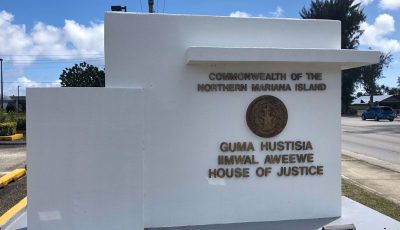Appeal vs invalidation of contingency fees under advisement
The CNMI Supreme Court has placed under advisement the appeal of attorneys Antonio Atalig and Reynaldo Yana against Superior Court Associate Judge Kenneth L. Govendo’s order invalidating the contingent fee agreements they entered with the estate of Angel Malite and Govendo’s subsequent order reducing their award of attorneys’ fees.
Then-Superior Court Associate Judge Juan T. Lizama awarded in 2006 $1.25 million in attorneys’ fees to Atalig and Yana for their work securing the $3.4 million that the Marianas Public Land Authority paid the Malite estate in settlement for a parcel of land.
In June 2012, Govendo awarded Atalig and Yana only $75,525 in attorneys’ fees and ordered them to return $1.2 million plus interest to the Malite estate.
CNMI Supreme Court Associate Justice John A. Manglona and Justices Pro Tem Timothy H. Bellas and Robert J. Torres Jr. heard Atalig and Yana’s appeal last week.
Atalig argued on his behalf and for Yana. Attorney Tiberius Mocanu argued as counsel for the Malite estate.
Atalig argued that the contingent fee agreements were valid, or in the alternative, that the attorneys’ fee award was improperly reduced.
Atalig and Yana claim Govendo erred when he invalidated the contingent fee agreements and when he reduced the attorney fee.
Atalig argued that this case started in 1969 when a probate was opened for the Malite estate during the Trust Territory High Court.
Atalig said he started in 1995 providing legal services to Jesus Tudela, then administrator of Malite estate with respect to the Texas Road land exchange and wetland compensation.
Atalig said it’s been 21 years of his life that he has been engaged in this case.
“We are appealing the validity of the trial court’s decision with respect to contingency fee,” he said.
Atalig said the cases cited by Govendo in invalidating the contingency fee were totally false, a misrepresentation to the judiciary and to the Commonwealth.
Atalig said when the $3.4 million was awarded, it was a civil matter and not in the probate proceedings.
Atalig said there was no objection to his contingency fee, but when the award of his attorney’s fee was made by Lizama in 2006, that’s when they received objection from an heir represented by attorney Stephen Nutting.
Atalig said there was no hearing made on his itemized billings.
He said he and Yana submitted their report on fees, but Govendo was not satisfied so they submitted the second billings and accounting.
Atalig said he took the case out of the goodness of his heart because the heirs have no money.
In their brief, Atalig argued that assuming that there is a law that authorizes the trial court to invalidate a contingent fee agreement short of fraud, Govendo’s ruling that the contingent fee agreements entered into by Atalig and the heads of the Malite clan are invalid and unenforceable is not supported by substantial evidence.
Assuming that there is a law that requires the invalidation of contingent fee agreements, Atalig said the trial court’s ruling that the contingent fee agreements are invalid and unenforceable is not supported by substantial evidence.
He added that the trial court’s award of fees to him and Yana is unreasonable.
Mocanu argued that the attorney’s fees that Atalig charged was unreasonable.
Mocanu said there is no evidence that there was a special skill performed that led to the payment of $3.4 million.
Manglona told Mocanu that it is a fact that it is hard to get land compensation from the government.
“You need some negotiating skills or connections,” Manglona said.
Mocanu said when Nutting was hired, the settlement negotiation started.
Manglona stated that “maybe Nutting had connection with the Attorney General at that time.”
In appellee Malite estate’s brief, Mocanu argued that Atalig and Yana had the burden to either prove that the contingent fee agreement was valid, or in the alternative that their billings were reasonable.
“They have done neither,” Mocanu said.
Mocanu said the contingent fee agreement is clearly unconscionable as it was obtained by coercion, unsupported promises, and the withholding of necessary information.
“Most importantly, the risk involved—little to none—bore no relation to the fees the attorneys stood to receive from a settlement they knew was a sure thing,” he said.
Mocanu said appellants engaged in clearly excessive billings, block billings, all of which were reconstructed after the fact in order to justify a fee that was fraudulently received and quickly squandered and hidden.
“The great weight of the evidence reveals a systematic pattern of lies, half-truths, and after-the-fact justification for egregious behavior,” Mocanu said.
He said this is the fourth and fifth time the appellants have had to create a record and bring at least a scintilla of evidence to support any of their contention.
He said there is, in fact, no evidence to support a finding that there was a valid contingent fee agreement or that the fees sought by appellants are reasonable.
He urged the high court to affirm the probate court’s findings and deem the contingent fee agreement void.
In his findings and final judgment issued in 2012, Govendo said after applying the factors listed in Rule 1.5 of the Model Rules of Professional Conduct, he finds that Atalig’s and Yana’s attorneys’ fees charged in this case are excessive and unreasonable.
Govendo said he finds that a total of $75,525 in attorneys’ fees is reasonable. The judge explained in his findings the breakdown of the $75,525.
The judge ruled that the prior judgment of $1,288,500 awarded to Atalig and Yana is reduced to $1,212,975.
Govendo made the findings after an evidentiary hearing on Feb. 3, 2012.
The evidentiary hearing was held because the CNMI Supreme Court remanded to the Superior Court for a determination as to the reasonableness of attorneys’ fees.
According to court records, after MPLT paid the Malite estate $3,450,000 in settlement for a parcel of land, Atalig and Yana sought $1,138,500 in attorney’s fees.
After Lizama awarded the $1.1 million fees to Atalig and Yana, Malite heirs filed a motion arguing that the fees were unjustified and needed to be returned.
In response, Govendo ordered the two lawyers to temporarily return the money to the court pending a final determination on the appropriate fee award.
When Atalig and Yana refused, Govendo held them in civil contempt and threw them in jail until they complied. Govendo subsequently held that Atalig and Yana were not entitled to any attorney fees.
Atalig and Yana appealed to the Supreme Court. The high court freed the two on Dec. 24, 2009.
In December 2010, the high court ordered the Superior Court to conduct a hearing on the appropriate amount of attorney’s fees to be awarded Atalig and Yana for work they performed for the Malite estate.
The high court ruled that when Atalig and Yana failed to comply with Govendo’s order, Govendo was permitted to find them in contempt and incarcerate them.
In May 2012, then-Superior Court Associate Judge David Wiseman ordered the suspension of Atalig and Yana from practicing law in the CNMI for misconduct with regards to their refusal to return $1.1 million in attorneys’ fees.



























